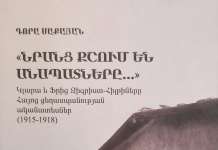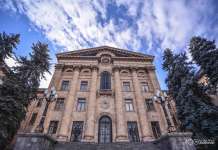
YEREVAN April 2- Voters across Armenia took part in the country’s 7th parliamentary election on Sunday, in what many observers described as the most important in Armenia’s modern history. The vote comes a year and a half after Armenia passed a controversial constitutional reform bill restructuring the country into a parliamentary republic.
The ruling Republican Party of Armenia, easily retained its position, winning nearly half the national vote and 55 seats. Oligarch, Gagik Tsarukyan’s party came in second with 30 seats, while the newly-formed liberal political alliance, YELQ had a surprisingly strong showing, with 9 seats. The Republicans are widely expected to form a governing coalition by adding their junior partner, the ARF’s 8 seats.
Despite well-documented evidence of vote-buying and voter intimidation in the weeks prior to the vote, both local and international observers have agreed that the voting process went on without any major irregularities typical of previous elections.
Voting process:
Building on the successful deployment of citizen observers in previous elections, civic activists and international monitoring groups worked to train thousands of observers to cover most of the 2000 election poll stations. They were joined by the OSCE’s team of election monitoring experts. This year, dozens of diaspora-Armenians travelled to their homeland to help ensure a smooth voting process. Among them were prominent Armenian celebrities the likes of Serj Tankian, Atom Egoyan and Arsinee Khanjian.
Both the United States and the European Union pledged to support a landmark election reform agreement between the opposition and the government by providing financial support, as well as electronic voting machines and live streaming cameras. Some reports of malfunctioning cameras were addressed in a statement by the EU representation in Armenia and quickly repaired. Some voting machines were also temporarily malfunctioning, including one which did not recognise President Serj Sargsyan’s fingerprint (despite repeated attempts). These glitches were attributed to technical error rather than ill intent.
Election day and results:
Of the 9 parties and blocs officially contesting the election, only 4 made it past the threshold: the Republican Party, the Tsarukyan Alliance, the YELQ bloc and the Armenian Revolutionary Federation.
Of notable absence in the new parliament are former president Levon Ter-Petrossian’s Armenian National Congress, Arthur Baghdasaryan Rule of Law party Raffi Hovhannisian’s Heritage Party. The latter of which has been reduced to a shadow of its former prominence when Hovhannisian emerged as an unlikely challenger in the 2013 presidential election.
Free, but unfair election?
Splitting from a long Armenian political tradition of defeated candidates calling foul, the opposition did not contest the results. YELQ published a statement citing the tally as: “on the whole formed as a result of voting by the citizens who took part in the elections.”
This sentiment was echoed by the OSCE observers who witnessed very few major voting irregularities on election day. A spokesperson for EU commissioner Federica Mogherini pledged continued support for Armenia’s “democratically elected new Parliament and Government.” The Embassy of the United States in Yerevan, meanwhile, released a statement broadly praising the election process, noting that “voters were able to freely exercise their right to vote”. Some have attributed the smooth process to the presence of Batman as a registered election observer.

Critics of the government have noted, with some truth, that the ruling Republicans’ employment of ‘administrative resources’ gave it an unfair electoral advantage. As with previous elections, reports of government officials coercing civil servants to vote for them have surfaced. Teachers, hospital workers and police officers were threatened with dismissal unless they voted for the Ruling party. Older voters, with vivid memories of soviet-era ‘elections’, often comply out of fear.
The most damning evidence of ‘administrative resources’ being used in the government’s favour came with the release of a report by the Union of Informed Citizens where school principals admitted to collecting votes for the ruling party. The group impersonating Republican Party officials called the principals of over 136 schools, 114 of whom reported that they had worked to secure parents’ votes. In one recording, the Principal of a Gyumri school who had garnered a list of 1700 names proudly announced that they were “using all methods, including intimidation, to deal with voters”.

Republican Party spokesman, Eduard Sharmazanov deflected criticism, accusing the UIC of deceiving the principals by impersonating Republican officials. The Central Election Committee, which investigated the report at the request of the Opposition claimed to find no wrongdoing on the part of the RPA on the grounds that the recordings didn’t constitute enough evidence to disqualify the party. The CEC has let off the RPA with nothing more than a slap on the wrist for obvious campaign violations in the past, including confirmed cases of vote-buying, and election-related violence.
Bribes have become a staple of this election’s campaign season. The primary culprits being the ruling Republicans and the Tsarukyan Bloc. These parties have taken advantage of widespread apathy by convincing voters to ‘sell’ their votes in exchange for cash or other benefits. In some cases, voters would literally hold out for the highest bidder. Styopa Safaryan, of the opposition Free-Democrats, recounted being approached by a man at a rally in Vanadzor, asking what sort of ‘compensation’, his party was offering.
Not everyone was enticed by vote-buying and intimidation, however. Tatevik, a young school-teacher, defied orders to vote for the Republicans. Her entire family instead voted for the opposition YELQ bloc.
Entrenched anger over the death of the ‘Bread Bringer’, (who succumbed to an illness he contracted while in police custody following his involvement in last year’s ‘Sasna Tsrer’ incident) may have also pushed some voters away from the Republicans.
Analysis:
Sunday’s election is notable for a number of reasons: It can easily be counted amongst the ‘cleanest’ ballots in Armenia’s history. Most International observers, as well as the opposition, has conceded that despite some violations on voting day, the final tally corresponded with the ballots cast by voters. The question remains whether the ballots cast reflected the real intentions of citizens. It is apparent that the Republicans have used every resource at their disposal. In doing so, they accomplished the impressive feat of securing reelection despite being the most unpopular government in recent history. The opposition subsequently failed to stand out as a clear alternative. The resulted voter apathy was easily exploited by the regime.
Despite cleaner elections, vote-buying has been persistently identified as a major problem. This is more of a cultural, rather than a systemic issue since vote buying is typically possible with vote selling. Civil society’s message that votes matter and should not be sold for short-term gain has yet to resonate with voters.

Twitter user, Nune Harutyunyan put it this way: “Next time, I won’t protest against the govt, I’ll protest against the people who sold themselves and my future”
This election can also be seen as a turning point for opposition politics. YELQ’s remarkably strong showing has transformed the bloc into the country’s dominant liberal opposition force overnight. Formed as an alliance between the two recently-established liberal parties: Bright Armenia and Civic contract and the older Republic Party, YELQ nurtured a following amongst younger, mostly urban voters thanks to its ‘down to earth’ rhetoric and savvy use of social media, like its hashtag #Yelqka (there is a way out). The reputation Its leaders, the firebrand former newspaper editor, Nikol Pashinian and the US-trained human rights lawyer, Edmon Marukyan as straight shooters in Parliament has also helped them stand out in a roster filled with political has-beens.
They have replaced Hovhannisian’s Heritage party in that role. The latter’s poor showing as part of an electoral alliance with Vartan Oskanian and former defence minister, Seyran Ohanian has driven the final nail in the coffin for their respective political careers. The same can be said for Rule of Law’s Arthur Baghdasaryan.
Conclusions:
Sunday’s election will have far-reaching implications for Armenia’s future. The effective use of new electoral monitoring technologies and methods, as well as the diaspora’s participation, have demonstrated that change can be accomplished through the ballot box. Serious hindrances for democracy, such as the unfair use of state resources, and vote-buying remain.
The new parliament will be faced with a real challenge. It will be tasked with reviving the country’s sluggish economy, raising living standards, and restoring the broken social contract with disillusioned citizens. The Republican-led government, headed by the new, and charismatic Prime Minister Karen Karapetyan has made a number of promises in the run-up to the elections. Citizens should hold them accountable. In the meantime, it is up to the opposition to position itself as a clear, and proven alternative to the status quo. It has 5 years to accomplish this feat. The clock is ticking. Raffi Elliott










